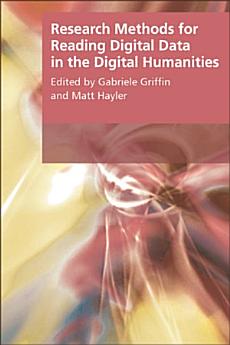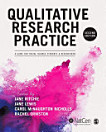Research Methods for Reading Digital Data in the Digital Humanities
Gabriele Griffin
Feb 2016 · Edinburgh University Press
Ebook
256
Pages
family_home
Eligible
info
reportRatings and reviews aren’t verified Learn More
About this ebook
The first volume to introduce the techniques and methods of reading digital material for researchDigital Humanities has become one of the new domains of academe at the interface of technological development, epistemological change, and methodological concerns. This volume explores how digital material might be read or utilized in research, whether that material is digitally born as fanfiction, for example, mostly is, or transposed from other sources. The volume asks questions such as what happens when text is transformed from printed into digital matter, and how that impacts on the methods we bring to bear on exploring that technologized matter, for example in the case of digital editions. Issues such as how to analyse visual material in digital archives or Twitter feeds, how to engage in data mining, what it means to undertake crowd-sourcing, big data, and what digital network analyses can tell us about online interactions are dealt with. This will give Humanities researchers ideas for doing digitally based research and also suggest ways of engaging with new digital research methods. Key featuresFirst volume centred on the navigation and interpretation of digital material as research methods in the HumanitiesUp-to-date analyses of issues and methods including big data, crowdsourcing, digital network analysis, working with digital additionsBased on actual research projects such as para-textual work with fanfiction, reading twitter, different kinds of distant and close readings
About the author
Gabriele Griffin is Chair in Gender Research at Uppsala University, Sweden. She has a long-standing research interest in research methods for the Humanities, and in women's cultural production. Recent publications include The Emotional Politics of Research Collaboration (co-ed.; Routledge 2013) and The Social Politics of Research Collaboration (co-ed.; Routledge 2013). She is editor of the 'research Methods for the Arts and Humanities' series (Edinburgh UP).
Matt Hayler is a Lecturer in post-1980s Literature at the University of Birmingham specializing in Digital and Cyberculture Studies, specifically (post)phenomenology and Cognitive Science influenced approaches to e-reading and to technology more broadly. Recent publications include Challenging the Phenomena of Technology (Palgrave 2015) and chapters on technology and the digital humanities in forthcoming volumes on Futures for English Studies (Palgrave 2016, co-written with Marilyn Deegan) and Theatre Performance and Cognition (Methuen 2016).
Rate this ebook
Tell us what you think.
Reading information
Smartphones and tablets
Install the Google Play Books app for Android and iPad/iPhone. It syncs automatically with your account and allows you to read online or offline wherever you are.
Laptops and computers
You can listen to audiobooks purchased on Google Play using your computer's web browser.
eReaders and other devices
To read on e-ink devices like Kobo eReaders, you'll need to download a file and transfer it to your device. Follow the detailed Help Center instructions to transfer the files to supported eReaders.







